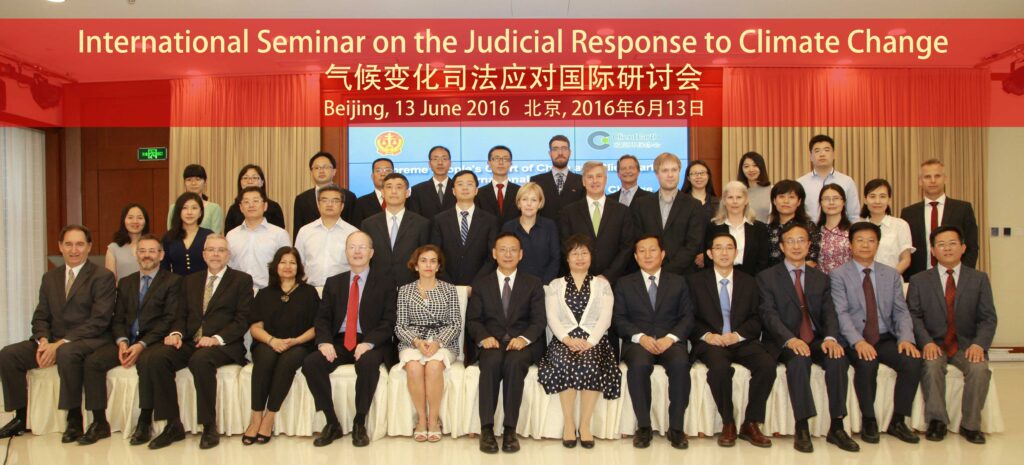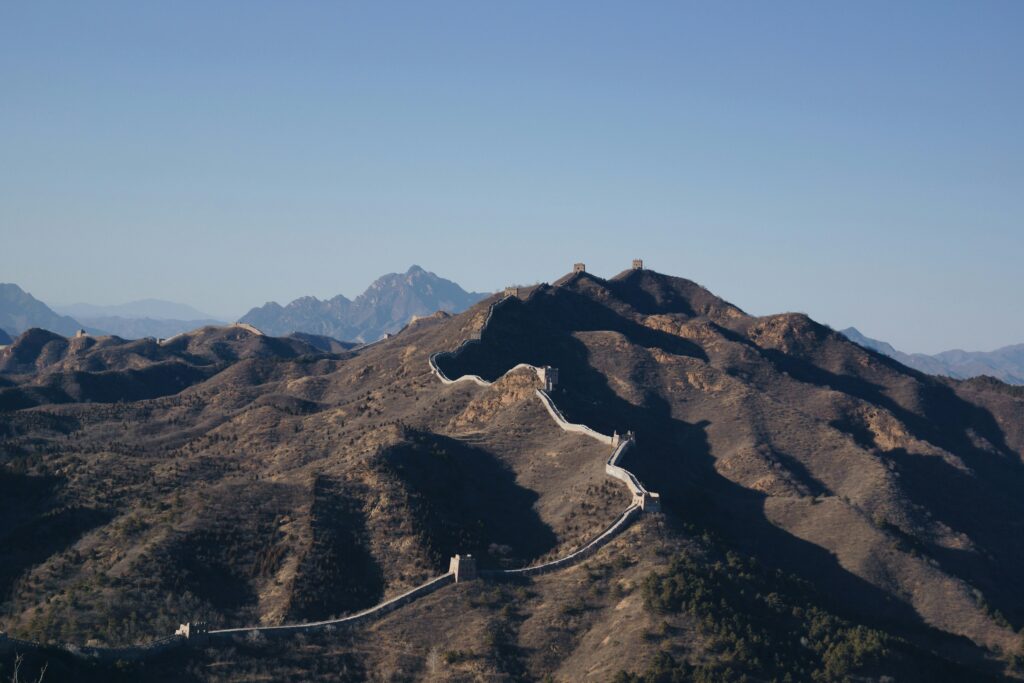(In 2022 I revised the award-winning 2017 book Client Earth for Spanish publication. The text was heavily revised and updated, and I present the chapter on China here in its English version, updated as of February 2024.)
Back in 1992, the China Council for International Cooperation on Environment and Development (‘the Council’ or CCICED, pronounced ‘sea-said’) was established by the State Council of the Chinese government. Its mission is to foster cooperation in the areas of environment and development between China and the international community. An equal proportion of Chinese and international members are ‘chosen for their experience, expertise, and influence’.
‘For China to develop well,’ the Council’s Chair, Zhang Gaoli, told the Council’s AGM in 2014, ‘we have to draw modestly on all the best practices around the world, and to learn from all the civilizations around the world. Only by doing that can we develop well.’
Bands of Chinese officials went roving to find global leaders in public interest environmental law. In the summer of 2014, one panel of Chinese policy advisers reached Brussels. The group was headed by Wang Yuqing, the former Deputy Environment Minister of China, and included a member of the National People’s Congress, China’s lawmaking body.
They were guided by a Dutchman, Dimitri de Boer, who ran the EU-China Environmental Governance Programme. ‘They came in with specific environmental laws that were being drafted,’ Dimitri recalled, ‘and they told me some of the key sticking points and points of controversy that they wanted to have an international sounding board for. I brought in experts like James Thornton to answer those questions.’
James Thornton, President and Founder of ClientEarth, cut short his summer holiday and trundled by train from southern France. There was no clear reason to do so. Governments in Europe were largely antagonists in the environmental arena; the likelihood of China seeking genuine dialogue with a representative of a European NGO was slim. Still, the delegates had come a long way from China, and James headed a Brussels law office. Some show of welcome was polite.
As James spoke to the assembled group, he saw some faces become alert. He had set up and run public interest law programs in the USA and battled to instill them into Europe. He spoke of bringing a hundred cases to enforce the Clean Water Act in US Federal Courts. ‘They were intrigued,’ James said. ‘And then I explained how those cases had a deep, ulterior motive. By doing the government’s work for them single handed, I meant to embarrass them into resuming the work themselves. That’s what happened. How the delegates loved that; they laughed and laughed. It perfectly fit the Chinese notion of “face”, shaming the government into doing its duty by doing it for them. And then when they stopped laughing, their questions started. Real and good questions.’
Wang Yuqing explained how they were eager to get more NGOs going in China. Could such NGOs work if the government supported them or would they lose their independence? How would that situation work in the West? The government’s study of how to kickstart a new generation of Chinese environmental NGOs was clearly in earnest.
The delegates returned to China. Shortly afterwards, an invitation from the EU-China Environmental Governance Programme arrived in James’s London office. Would he fly to Beijing and share his experiences with judges of the Supreme People’s Court?
This was for September 2014. China’s revised Environmental Protection Law was about to take effect, and a judicial interpretation was urgently needed to give courts a framework for how to deal with cases brought by NGOs.
Humans have progressed from a stone age civilization, through an agricultural civilization, and then an industrial civilization which is at the end of a 300-year run of unsustainability. China has decided to articulate and force into being the next era of humanity’s planetary existence. It has pledged to bring into being ‘ecological civilisation’.
The phrase was coined by the agricultural economist Qiang Ye in 1984 and became the substance of rigorous debate in Chinese academic circles. That debate retrieved the concept from Ancient Chinese religious and philosophical discourse. For example, 2,500 years ago, Laozi wrote: ‘Man takes his law from the Earth; the Earth takes its law from Heaven; Heaven takes its law from the Tao. The law of the Tao is its being what it is.’
‘Ecological civilisation’ entered politics in a report to the 17th National Congress of the Chinese Communist Party in 2007. The phrase became enshrined in the Chinese Communist Party’s Constitution in 2013. For the current leader, Xi Jinping, the forging of an ecological civilisation is a cause ‘benefiting both contemporaries and future generations’.16
In a parallel shift of focus, in October 2014 the Communist Party pledged to establish the ‘rule of law’ by 2020. China’s foremost environmental lawyer Wang Canfa has remarked, ‘In the past 30 years, China’s modern environmental law has developed from nothing to an independent and important section of China’s law system.’19
The task of ushering in an ecological civilisation is monumental. It needs all the new laws going, and every enforcement mechanism. Lawyers and judges need training, and citizens need fair and generous access to information and justice.
James flew to Beijing alongside two senior European judges. Their objective? To address a full day’s meeting at Beijing’s Grand Hyatt Hotel. James’s particular task was to share his wealth of experience with public interest environmental litigation.
The meeting turned out to have a dual purpose. The morning session focused on judicial interpretations for the Supreme People’s Court. In the afternoon, attention switched to members of the National People’s Congress. They attended because they were finalising an amendment which would allow prosecutors to bring public interest cases against local governments.
‘It worked out really well,’ Dimitri recalled. ‘Senior representatives from both the Supreme People’s Court and the National People’s Congress Standing Committee met James, to discuss how they should set up the system for environmental public interest litigation and a trial for public interest litigation by prosecutors. James was the star of the show. Two legislative documents were issued in the last months of 2014, incorporating the key recommendations James had made — particularly regarding setting up the rules for cost bearing in such a way that NGOs would only lose a little if they lost their case. It’s hard enough to build a strong case, and it’s unrealistic to expect that an NGO would be able to afford high court fees or the legal costs of the defendant.’
Soon after, in February 2015, James secured a meeting inside an impressive room in the Supreme People’s Court building, with one clear agenda item: could ClientEarth set up an office in China, and start formal cooperation with the Court? A chandelier cast light onto a vast white and brown marble table, which was surrounded by white leather chairs. James and Dimitri de Boer sat with a translator on one side, and a grouping of Supreme People’s Court judges and advisers on the other.
Chief among these was Wang Xuguang. He can be utterly charming, with a Buddha-like sense of beneficence and calm, but you don’t mess with Judge Wang.
‘We talked for an hour,’ James said, remembering the encounter. ‘Judge Wang gave whole hearted approval of ClientEarth’s plan: following the end of the EU-China Environmental Governance Programme, Dimitri and the project team would start a ClientEarth office in Beijing, and continue the judges trainings they had provided alongside the Ministry of Environmental Protection.
‘James, please do your work in China,’ the judge said, ‘Carry on with these trainings, and do more of them, and we’ll be extremely grateful. You can start by training us, the environmental judges in the Supreme Court, and continue to train the thousands of environmental judges around the country.’
‘James made a very strong case about one way cost shifting to the Supreme Court,’ Dimitri remembers of that September training day. ‘ We can look at feedback from them. It had an effect. Some of the Supreme Court people were very candid about telling James which areas they followed up on and built into their system, and were very grateful to James for a bunch of things he said.
‘It’s clear that the Supreme Court’s very conscious of the difficulties that NGOs face in bringing such cases — particularly financial but also in terms of their lack of capacity. Their judicial interpretations include clauses that protect the NGO from excessive costs and allow them to get cost recovery.
‘Also, if they come up with a case that seems compelling but for which they don’t have very adequate evidence, judges will go out and physically supervise the evidence collection. If the court takes the evidence, who are you to argue that the evidence is wrong?’
In June 2016, the Supreme People’s Court called three hundred environmental judges to Beijing for their annual training, with ClientEarth as an official partner. James flew in and added the sum of his experience, joining as a lecturer and bringing in other Western experts. It marked the first time Chinese judges were trained on climate change.

Earlier that week, James co-led a seminar on climate change litigation in the Supreme People’s Court for its members. That seminar, too, was a first – no foreign experts had ever been invited to a seminar held inside the Court’s building.
After the training, when speaking to the three hundred assembled judges, Judge Wang made a point of saying that climate change litigation, broadly defined, should become a priority for the Chinese judiciary.
James became a member of the China Council for International Cooperation on Environment and Development (CCICED). ‘The way I think of the CCICED,’ James says, ‘is as the environmental think tank for the State Council and Politburo. It develops ideas by combining the efforts of Chinese experts and Western experts. It is a powerful formula.’
A new law came into effect in 2017 which required international NGOs to be registered, and have a government sponsor. ClientEarth became the first European NGO to get an official registration sponsored by the Ministry of Environment. By 2021, as his Beijing team kept growing, Dimitri was preparing for his third office move. They had trained thousands of judges and prosecutors. What have those prosecutors been doing with their new skills and power?
Qiu Jinghui had been a prosecutor for all of his career. He became specialized in preventing government corruption, and the work suited him well. In July 2015, he applied to join a new team which would be dedicated to public interest litigation. Thirteen provinces would conduct trials, where local prosecutors would bring environmental public interest cases, primarily against government. Two years and thousands of cases later, the trials were considered so successful at getting local officials to follow environmental laws that President Xi Jinping personally endorsed the establishment of permanent public interest litigation departments in the Supreme People’s Procuratorate, and around the country.
Qiu grew up by the sea in Fujian Province, and fondly recalls catching shellfish as a little boy. But all that changed during his college years. ‘Economic development was the overriding priority. Several big bleaching and dyeing houses moved into my town, and a few years later the coastal water was so polluted that it was devoid of life.’ Compared to those from northern China, people from Fujian generally have an international mindset. With its many fishermen and seafaring traders, there is a strong diaspora from Fujian around the world.
Over several years, through international seminars, trainings, and overseas study visits, ClientEarth cooperated with the Supreme People’s Procuratorate. Not having an environmental background, Prosecutor Qiu welcomed their support. He became a deputy in the national team that oversaw the public interest prosecution work. In that capacity, he led the effort in protecting the Yangtze River, China’s longest river, at the core of the most developed region. He also supported the work of the Central Environmental Inspections, powerful new teams formed of environmental officials and anti-corruption inspectors, who dig up environmental problems of provincial leaders and large state-owned enterprises. And he trained the thousands of prosecutors newly assigned to protect the environment.
In October 2019, he joined a ClientEarth delegation to the Netherlands and Belgium. One of the delegation members spoke at a conference of environmental prosecutors from all over Europe. The European prosecutors were surprised to hear that their Chinese colleagues could bring cases against environmental violations by government – that would be unthinkable in their countries.
Qiu Jinghui considers the role of NGOs and prosecutors to be highly complementary. ‘Environmental NGOs have strong environmental knowledge and are good at discovering environmental problems. The prosecutors have much more resources and are in a position to bring cases against government departments. By working together, we can be way more effective.’
He describes a case in the island province of Hainan, where a ship had been illegally dumping waste into the ocean. Eleven times over several weeks residents had called a hotline, but the local government department in charge kept telling them they couldn’t find any evidence of wrongdoing. The local public interest prosecutors were monitoring the hotline and grew suspicious. Why the repeated calls and lax reaction from government? So they went to the site and found a makeshift dock, but no ship.
A few days later, the prosecutors secretly went back with aerial drones, and obtained video footage of the ship dumping a huge load of waste in broad daylight. The ship was impounded. Following a rigorous assessment and court case, the judge ordered the defendants to out right the damage they had caused and pay over 9 million RMB (1,3 million USD) in environmental damages.
With his love of the sea, Qiu is particularly pleased with this example of public interest prosecutors doing their work. ‘Nobody wants to see the ocean being degraded like that,’ he says. And he hints at possible collusion with local government officials. “The case is important because it led us to the illegal industrial chain and the ‘unspoken rules’ in the industry which we must rectify. When it’s all wrapped up we should really make a movie out of it!’
2020 was a record year for the public interest prosecutors – over 80.000 environmental cases were brought around China. ClientEarth received a letter embossed with the name of the Public Interest Prosecution Department of the Supreme People’s Procuratorate. People fear such letters. What had they done wrong? Fear switched to relief as the letter unfolded. The Procuratorate were expressing appreciation for all the cooperation since those initial trials of 2016, and for the trainings on important topics like biodiversity and climate change. This cooperation is unique in China – it is the only example of an NGO working so closely with the Procuratorate. ‘We look forward to seeing you remain committed as you always do to supporting the development of China’s procuratorial PIL [Public Interest Law] system,’ the three-page letter concluded. ‘Let us join hands to build the world into a better place!’
In 2018 China’s Ministry of the Environment established an international coalition to work on greening the Belt and Road, and invited James Thornton of to join as a governing board member. They were now ready to conduct joint research on an environmental standard for China’s overseas investments. In earlier discussions James had mooted a ‘traffic light system’ and the Minister now called for such a system to be set in place, where proposed projects would be rated green, yellow, or red, based on their environmental and climate impacts. Coal power would be in the red category, which would effectively put them on an exclusion list. The effort got a further boost in April 2019, at the second Belt and Road Forum, when President Xi Jinping said that the Belt and Road must be “open, green and clean”.
The key lever for greening China’s overseas investments are the state-owned financial institutions. There are thousands of projects and developers, but only a handful of financial institutions behind them. When they go green, the whole Belt and Road goes green. The financial institutions would be the key target group for the traffic light system.
By late 2020 there had been remarkable progress in developing the traffic light system. It was the one project that kept going at full speed, despite COVID-19. Everyone realized the critical importance of having a system to prevent environmentally harmful investments, and encourage green ones.
In late June 2021 ClientEarth cooperated with China’s Ministry of Environment to host the first training on environmental and climate risk management for China’s largest financial institutions. All of them were actively developing policies to green their portfolios. China had not yet announced the coal ban, but evidence of the message was coming through. 2020 was the first year where renewable investments in the Belt and Road exceeded coal, and in 2021 China pulled out of a huge new coal plant in Zimbabwe and refused to discuss new coal projects in Bangladesh.
In October 2023 world leaders flew to Beijing and gathered in the Great Hall of the People, celebrating the 10th anniversary of the Belt and Road. As part of the board responsible for ‘greening’ the Belt and Road, James flew in to join those world leaders and speak from the stage.
‘On the first night of my trip,’ he recalls, ‘the deputy head of the Bar Association of Beijing gave a small banquet to honor me and the work of ClientEarth. At the dinner the number two environmental prosecutor gave a speech, saying that the legal work we have started in China would still be delivering benefits in 1,000 years.’

The next day James joined sixteen heads of state from Belt and Road countries and their delegations in the Great Hall of the People. ‘President Xi Jinping’s speech was remarkable,’ James recalls. ‘We’re used to the vagaries and hopeful or empty words of politicians. This was different. More like the CEO of a powerful company addressing shareholders. He spoke for forty minutes, all of it substantive. He reflected on the first ten years of the Belt and Road, what had worked well and what not. Then on to the next ten years, articulating eight principles. The fourth was that Belt and Road investment is to be greened. This is important, as it is an instruction to all Chinese entities, and something we have been working for 5 years to get to. Two other points relevant to our work include that there will be established a new Belt and Road facility to link finance with green investments, which will make our work easier. And that China will train engineers and other experts from Belt and Road countries, to build up those countries’ capacity.’
Having worked with the Supreme People’s Procuratorate since 2016, James was invited to speak to the group at a convention February 2024. ‘It has been a highlight of my professional life to experience this cooperation and the extremely rapid and powerful progress the prosecutors have made.’ he told them. ‘China’s prosecutors have established specialized public interest litigation departments around the country. In the past five years, they have brought around 400,000 environmental public interest cases. Nothing like this volume of cases to protect the environment is brought anywhere else in the world.’
Among other areas they have worked on wildlife protection, river basin management, and food and drug safety. An upcoming Law of Procuratorial Public Interest Litigation will provide them with an even more robust legal basis for their work.
James is known for finding hope in the struggle for saving the planet, even after four decades on the frontline of environmental activism. His evidence of progress in China is a big part of that. ‘Climate change and biodiversity loss aren’t going to be solved without China,’ he reflects. ‘Given global political tensions at the moment, I see our work with China on climate and nature to be an international sweet spot.’





